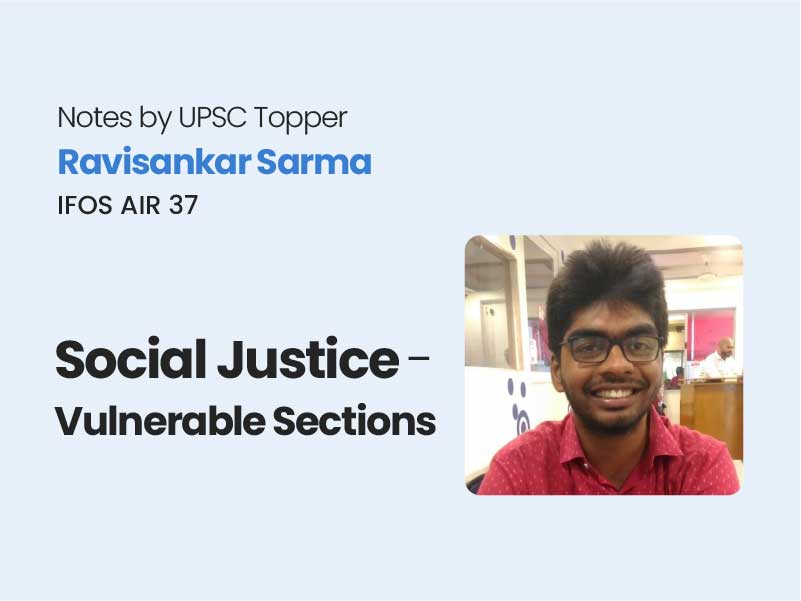Companion@360 → 7 Month programme to sharpen your writing skills → REGISTER NOW

MAHARASHTRA’S SOCIAL BOYCOTT BAN LAW
- Targeted at informal caste panchayats (or village councils) and denial of service to citizens due to virtue of caste, morality, social acceptance, political inclination or sexuality – ostracism by dominant sections of society
- A clear example of a renewed political will of the Maharashtra Government to place individual liberties over social acceptance or cultural tolerance in a marked departure from previous governments who have often favoured the cause of the group over the individual
What it includes?
- Specifies practices which come under social boycott- ‘preventing performance of religious or caste customs and traditions’, ‘denial of right to perform funeral or marriages’, ‘denial of public facilities to communities – halls, medical, education services’
- Criminal Offence with imprisonment of upto 3 years
- Ensures trials are completed within 6 months of filing of report
Concern
- People of the religion may advocate that their fundamental right of freedom to manage religious affairs may be violated and challenge the legislation in court with regard to its constitutionality
- New legislation does not address inter community social ostracism like denial of housing to minorities, attacks due to virtue of diet or dress
Way Forward
Legislation is a basic foundation for implementation of democratic principles which in this case is equality. The government should politically take steps to ensure that a climate of prejudice and intolerance is gradually replaced with one of social harmony.
Domestic Workers’ Rights- Domestic Workers Regulation of work and Social Security Bill, 2016
- Currently unrecognized as an economic activity, Indian state has not implemented ILO’s Convention 189 on Decent Work for domestic workers to bring domestic work under state regulation
- Largely constituted by citizens belonging to vulnerable communities – women, tribal community, SC/ST
- Prejudiced to be a security risk are subjected to police verification affects dignity enshrined in constitution
- Face risk of domestic violence, abuse, sexual harassment
- Intense work, persistent surveillance and quasi-magisterial authority of employer implode the dignity of domestic workers
- Lack of adequate redressal mechanisms
- Provided protection under Sexual Harassment of Women at Workplace ( Prohibition, Prevention and Redressal)
- Unorganised Sector – No minimum wages, poor conditions of work, no security
Read Also National Register of Citizens
Prospective Solution
- Domestic Workers Regulation of work and Social Security Bill,2016 aims to monitor domestic workers by making mandatory registration of employer and worker
- Mandates collection of cess from the employer which would be utilised for social security fund of the worker
- The workers access would be mediated through an ID card which achieves the objectives of police verification sans criminalisation but empowering them through a rights based approach
Manual Scavenging
- An occupation historically reserved for the Dalits and lower caste strata of the Indian society
- Inhuman practice of cleaning up human faeces from dry latrines
- In 2013, SC banned manual scavenging and ordered removal of dry latrines
- Rashtriya Garima Abhiyan is a government welfare programme aimed at eliminating manual scavenging and providing those sections of society with alternate livelihoods
- However, manual scavenging is still a prevalent occupation in several backward regions in the country owing to caste hierarchy and lack of alternate livelihoods
- Manual scavenging renders its workers vulnerable to diseases due to the unhygienic environment that consumes their day to day work to which they eventually succumb to death
- Safari Karamchari Andolan is an NGO that strives for the elimination of manual scavenging
Anti-Racial Discrimination Law
- Section 153A of IPC – Government is planning to strengthen the law against racial discrimination with stringent penalties but is receiving a lukewarm response from states
- North-East population is largely affected by racial discrimination in other parts of the country
- Manipur, Meghalaya and Mizoram (along with U.P) is supportive of the proposed legislation
- As the matter comes under concurrent list, the consent of the states is required
Stalking Law
- Stalking considered among ‘minor’ sexual offences and only offences that inflict bodily harm on women are considered grave and to be acted upon
- In popular culture, stalking is often romanticised and accepted
- 2013 amendment recognized stalking, voyeurism and eve-teasing as a criminal offence and negates the intention of the perpetrator as irrelevant as long as the woman has expressed her dissent. Hence the burden of proof rests with the accused and unless proved otherwise, he would be held guilty
- It also recognizes online stalking as a crime if it results in fear of violence or serious alarm or distress of the mind
- Stalking has to be recognized as a criminal offence that denies women their rightful public space and right to free movement and dignity.
